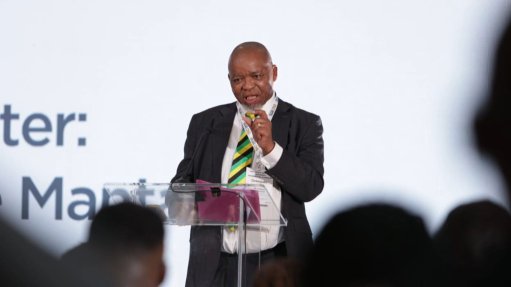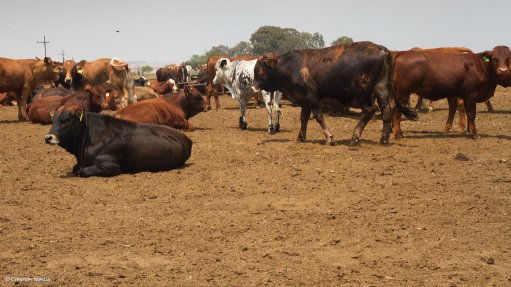South Africa's energy transition gathers pace
Speakers across a range of disciplines and domains have said that South Africa's electricity market is transitioning to a more pluralistic market that will also include a much larger range of services to support generation, transmission, aggregation, grid balancing, energy trading, day-ahead and intra-day markets, besides others.
During consulting firm EE Business Intelligence's 'Electricity market development: The transition to a multi-market model' webinar, on October 26, University of Cape Town Graduate School of Business Power Futures Lab chairperson Professor Anton Eberhard said South Africa's electricity industry would never be the same again.
The Electricity Regulation Act Amendment Bill makes provision for the establishment of a transmission system operator (TSO) that will have four functions, namely operation and ownership, system operator, market operator and central purchasing agency.
"The TSO will provide a fair and transparent platform for contracting and trading electricity and will be insulated from Eskom's generation interests. This removes the conflict of interest of Eskom as generator and owner-operator of the transmission grid.
"The TSO will enhance competition as the sector moves inexorably to the new sustainable future," he said.
Currently in South Africa, wheeling is happening through physical bilateral agreements without a centralised market and competition is already present in the market, said Eskom Transmission Division Market Operator senior manager and power systems economist Keith Bowen.
"A lot of new generation is being built to supply customers and lots is happening without central market mechanisms, and this means that, for a large percentage of the network, the system operator does not know where generation will come from.
"At the moment the volumes are small, but as we add more generation capacity, the system operator needs greater visibility of what is happening on the network and to plan around it.
"The thinking around the establishment of a central market platform is for this type of information to be available and and for the market operator to facilitate trade more efficiently," he said.
Eskom has explored energy trading and the required mechanisms over many years, with the Eskom Power Pool that was launched in 1996, the Energy White Paper of 1998, the Reserve Markets study in 2001 and the Multi-market consortium report in 2003, among others, informing the design of the TSO.
Additionally, South Africa has used learnings from international partners about energy trading and markets in other territories to inform the design of the TSO and the transition to an open market.
As one of four functions, the TSO would function as a network operator, which was a business focused on the grid and expanding, upgrading, refurbishing and planning around the network, Bowen said.
"Then, the TSO's system operator function has been explored by Eskom for many years and it is expected to retain similar functions in the future, but with more renewables, more role-players and within a more complex environment as the market unravels," he said.
The idea, therefore, is to create a physical trading platform on which energy can be traded on a day-ahead, intra-day and real-time basis. This information would then be provided to the system operator to have visibility over what was happening on the grid at any point in time, and making the management process more efficient, said Bowen.
Part of the design of the central trading platform is to facilitate day-ahead, intra-day and real-time trading and contracting to enable planning and facilitation of generation, transmission, balancing and reserves commitments and positions by all parties.
"There is a transition [in South Africa] and, all things being equal, we expect to open the market on April 1, 2025, and start with willing buyers and sellers as well as including Eskom generation and distribution to create liquidity and certainty in the market, with a five-year transition phase to the market phase by 2030," Bowen said.
Additionally, the market operator will not trade and will only serve as a platform to sell and trade electricity through a set of rules. The current idea is to have a market code that sets out these rules for how the platform will operate, similar to the grid code.
"The main aim of the market operator will be to match demand and supply and clear the market and then ensure settlements take place for contracts," he added.
Meanwhile, Eberhard highlighted that the Electricity Regulation Act Amendment Bill includes sections about the TSO constructing a market code, which is central to the future of the market because it embodies the details of the rules of the act.
ORGANIC TRANSITION
Unusually, South Africa's reform process has no central team and no clear end vision or strategy to get there. The reforms are being done incrementally and the market has developed organically, said Eberhard.
"However, we are now going through a huge step to complement the market that has developed, including the bilateral market, and independent power producers wheeling energy across the grid to users. In response, we are now establishing the TSO and the market operator and expect a new range of trading platforms to be set up.
"All of this means we have important choices to make over the next while," he emphasised.
Meanwhile, a key recommendation for South Africa was to establish a market reform team to guarantee a holistic design, said electricity market systems specialist consulting firm Bredesen Consulting CEO Hans-Arild Bredesen, who had helped develop national and regional power market strategies for regulators, power exchanges and system operators in more than 20 countries or regions.
"Importantly, market reform is not a product, but an evolutionary process. Especially in the current changing world, we need to accept that market reform needs to be based on an agile process in which the stakeholders in the fundamental parts of the market come together and decide on the design," he said.
Therefore, the reform team needs political skills to ensure the political support is maintained; legal and regulatory experience to discuss and develop the governance model; and economic and market expertise to design the transitory and future market design; as well as detailed technical knowledge of the current South African power sector from both generation, transmission and distribution point of view.
"What is imperative is that this team will lead the overall market reform and thereby be the guarantor that the various projects meet the overall objectives. This would mean that the team will be established for several years to follow the market reform and its project implementations," said Bredesen.
The team can either be created under the auspices of the Department of Mineral Resources and Energy, or the National Energy Regulator of South Africa, or can be more loosely organised within the industry, but South Africa needs such a team to oversee and drive it.
Further, it was crucial to understand that the market would evolve over time and that South Africa should not attempt a so-called big bang approach to try to revolutionise the market overnight without allowing the system and people to adapt to the changes, he advised.
"Another key point is that, when figuring out the solution for South Africa, we need to build a solution for tomorrow, not yesterday. One of the drivers of the energy transition globally is climate change and this will see consumption patterns also changing, and hence the need for agility.
"South Africa also needs to develop and stick to a long-term strategy, such as Türkiye, which established a clear strategy for an energy market in 2004 and has to a large extent followed it and, in 2015, was able to implement its goal of establishing a market," he added.
Meanwhile, the next critical step for South Africa is to get stakeholder engagement around the development of the electricity market code. The National Energy Crisis Committee has a workstream that brings industry together to refine and finalise this code, said Eberhard.
"There are big changes ahead," he added.
Article Enquiry
Email Article
Save Article
Feedback
To advertise email advertising@creamermedia.co.za or click here
Press Office
Announcements
What's On
Subscribe to improve your user experience...
Option 1 (equivalent of R125 a month):
Receive a weekly copy of Creamer Media's Engineering News & Mining Weekly magazine
(print copy for those in South Africa and e-magazine for those outside of South Africa)
Receive daily email newsletters
Access to full search results
Access archive of magazine back copies
Access to Projects in Progress
Access to ONE Research Report of your choice in PDF format
Option 2 (equivalent of R375 a month):
All benefits from Option 1
PLUS
Access to Creamer Media's Research Channel Africa for ALL Research Reports, in PDF format, on various industrial and mining sectors
including Electricity; Water; Energy Transition; Hydrogen; Roads, Rail and Ports; Coal; Gold; Platinum; Battery Metals; etc.
Already a subscriber?
Forgotten your password?
Receive weekly copy of Creamer Media's Engineering News & Mining Weekly magazine (print copy for those in South Africa and e-magazine for those outside of South Africa)
➕
Recieve daily email newsletters
➕
Access to full search results
➕
Access archive of magazine back copies
➕
Access to Projects in Progress
➕
Access to ONE Research Report of your choice in PDF format
RESEARCH CHANNEL AFRICA
R4500 (equivalent of R375 a month)
SUBSCRIBEAll benefits from Option 1
➕
Access to Creamer Media's Research Channel Africa for ALL Research Reports on various industrial and mining sectors, in PDF format, including on:
Electricity
➕
Water
➕
Energy Transition
➕
Hydrogen
➕
Roads, Rail and Ports
➕
Coal
➕
Gold
➕
Platinum
➕
Battery Metals
➕
etc.
Receive all benefits from Option 1 or Option 2 delivered to numerous people at your company
➕
Multiple User names and Passwords for simultaneous log-ins
➕
Intranet integration access to all in your organisation




















